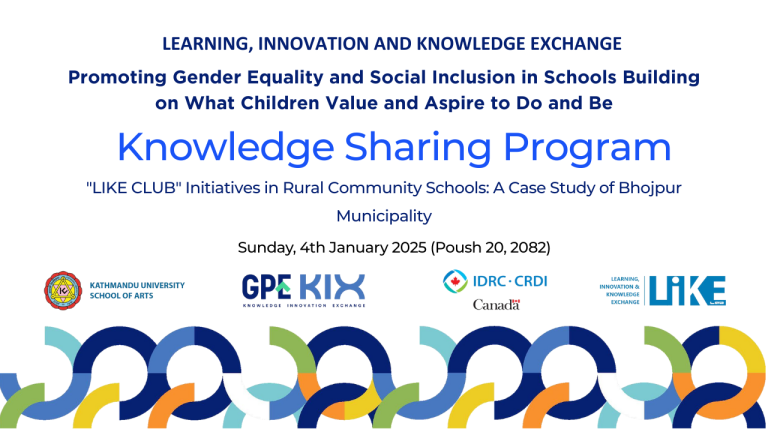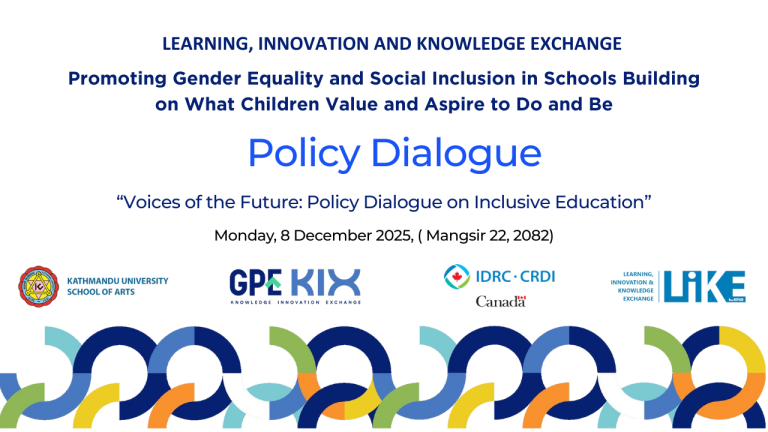
LALITPUR, NEPAL, December 18, 2024 — A learning session on Gender Equality and Social Inclusion (GESI), organized by the Learning, Innovation, and Knowledge Exchange (LIKE) Lab at Kathmandu University School of Arts, shed light on critical issues surrounding gender and inclusivity. The session featured a presentation by Dr. Lina Gurung, Assistant Professor, School of Education, Kathmandu University.
Dr. Gurung’s presentation unpacked foundational concepts of sex, gender, sexual orientation, and the intersectionality of identity through a detailed discussion of the SOGIESC framework. She also explored theoretical perspectives on gender and outlined the principles and approaches for fostering gender equality and social inclusion.
Key Highlights of the Session
1. Understanding Sex and Gender: Dr. Gurung distinguished between sex, defined by biological characteristics, and gender, shaped by societal and cultural norms. She elaborated on various gender identities, such as cisgender, transgender, gender fluid, and non-binary, encouraging a deeper understanding of diversity beyond the traditional male-female binary.
2. Sexual Orientation and SOGIESC Framework: The session emphasized that sexual orientation encompasses emotional, romantic, and sexual attraction, with classifications including heterosexual, homosexual, pansexual, and more. Dr. Gurung highlighted the SOGIESC framework, which goes beyond LGBTQI++ to integrate the fluidity and intersectionality of identity.
3. Theoretical Perspectives on Gender: Dr. Gurung presented diverse theoretical views:
- The Essentialist Perspective, viewing gender traits as biological and immutable.
- The Social Constructionist Perspective, attributing gender roles to societal expectations.
- Judith Butler’s Gender Performativity, which interprets gender as a performance through actions.
- Michael Kimmel’s Interplanetary View of Gender, describing men and women as complementary rather than opposites.
4. Principles of GESI: Central to the session were the six guiding principles of GESI:
- Equality of Opportunity: Ensuring equal access to resources.
- Recognition of Diversity: Respecting differences.
- Participation and Empowerment: Involving marginalized groups in decision-making.
- Proportional Inclusion: Demographic representation.
- Non-Discrimination: Eliminating bias based on gender, caste, or ethnicity.
- Social Justice: Addressing systemic inequalities.
5. Approaches to Gender and Development: Dr. Gurung also addressed strategies for integrating gender and inclusivity into development, including intersectionality, social inclusion, and rights-based approaches. She distinguished between meeting practical needs, such as healthcare access, and strategic needs, like achieving gender equity in governance.
Call for Inclusive Practices
Dr. Gurung emphasized on the importance of systemic approaches rooted in GESI principles, stressing that understanding gender involves the dynamic interplay of biological, social, and cultural factors. She called for inclusive practices that address structural barriers and empower marginalized communities. The session left attendees with a comprehensive understanding of GESI and actionable insights for fostering a more equitable society.
As LIKE Lab continues to champion learning and dialogue in this space, sessions like this highlight the platform’s commitment to addressing critical social issues through education and innovation.



